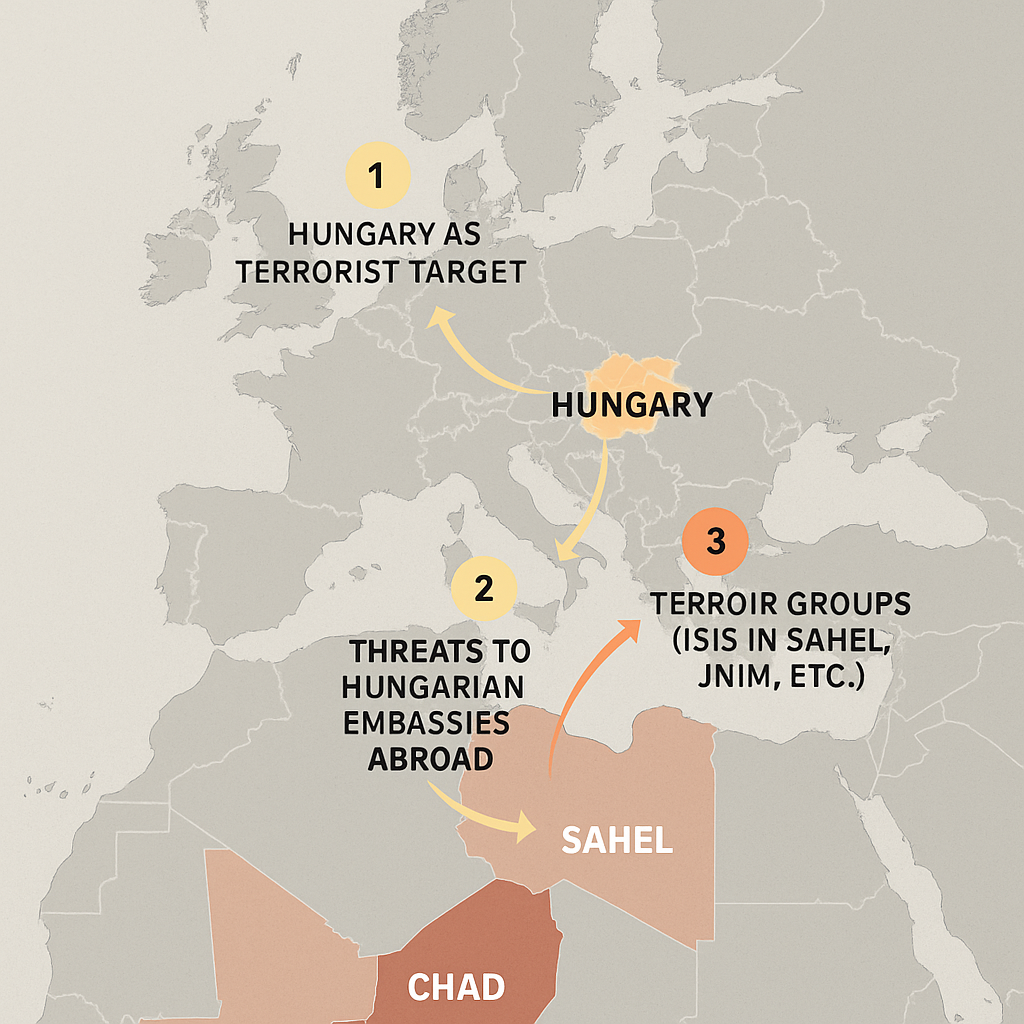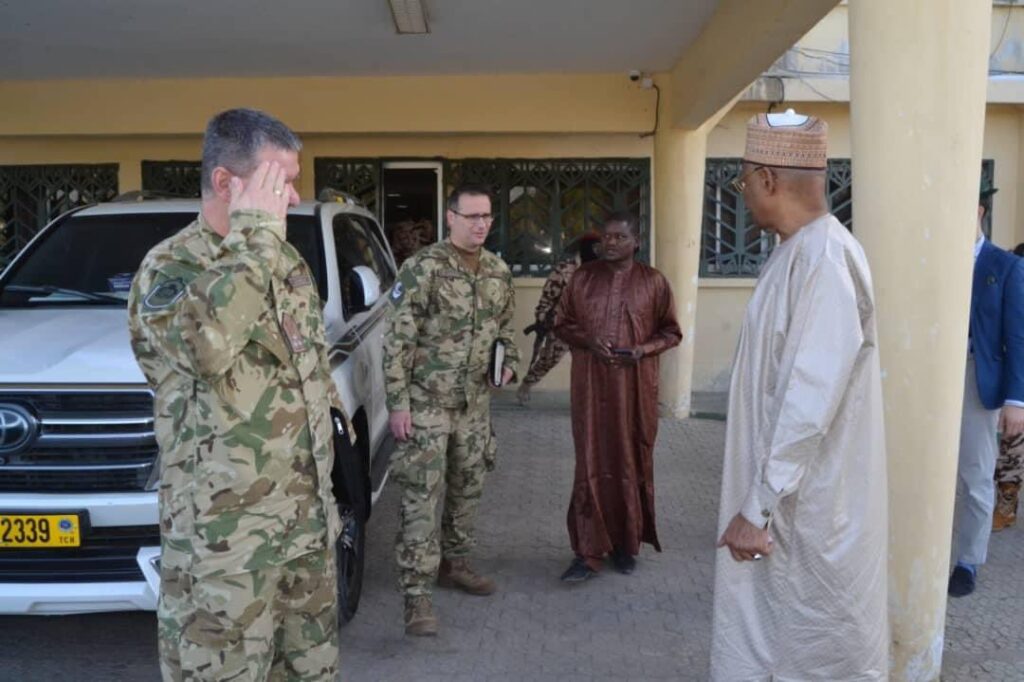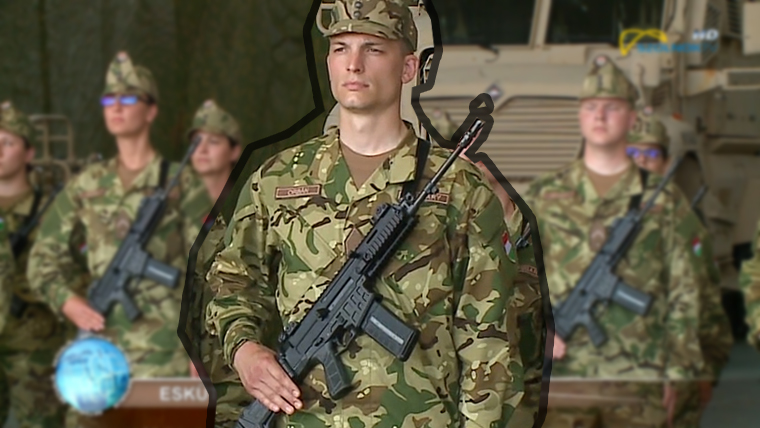Hungary’s decision — led by Gáspár Orbán, son of Prime Minister Viktor Orbán — to deploy 200 soldiers to Chad appears inconsistent with Budapest’s official policy of non-intervention and de-escalation in global conflicts. While Hungary refuses military aid to Ukraine, it is now entering one of Africa’s most unstable regions.
I. Strategic Context: Hungary’s Claimed “Neutrality”
- Budapest’s Official Line:
- Avoids escalation in the Russia-Ukraine war.
- Blocks EU military funding mechanisms for Ukraine.
- Refuses weapons shipments through Hungarian territory.
- Reality of the Chad Deployment:
- Chad is in a volatile counterterrorism environment involving French, U.S., and African Union troops.
- Hungarian military presence abroad, especially in Sahel operations, is a clear contradiction of its “non-interventionist” foreign policy.
- Gáspár Orbán is a former special forces officer and religious conservative — this deployment mirrors a personalist foreign policy often associated with regimes mixing faith, power, and military prestige.
II. Why Chad? Strategic Goals Behind the Deployment
- Influence Within the EU and NATO
- Hungary may be trying to rebuild credibility in Western security frameworks after blocking aid to Ukraine.
- It allows Orbán to say: “We support Western interests in Africa, not in Eastern Europe.”
- It may also be designed to win favor with France, which has long operated in Chad (former colonial sphere), or the U.S., which supports counter-terrorism in the Sahel.
- Creating a Leadership Portfolio for Gáspár Orbán
- The move might serve domestic political grooming purposes.
- Gáspár could be positioned as a “commander-statesman” to eventually inherit power or a major political role.
- Deploying troops abroad gives him military credibility and international exposure.
- Religious-ideological Agenda
- Gáspár Orbán has evangelical and Christian nationalist views.
- The Sahel is a hotbed of Christian-Muslim conflict zones, which may appeal to the Fidesz narrative of “protecting Christian civilization.”
III. Risks and Contradictions
A. Contradiction with Ukraine Policy
- Deploying troops in Africa while refusing to help Ukraine implies:
- Hungary does not oppose military operations, only anti-Russian ones.
- This strengthens arguments that Hungary’s policy is not about peace, but about preserving ties with Moscow.
B. Probability of KIA (Killed in Action)
- Chad is high-risk:
- Threats from ISIS in the Sahel (ISGS), Boko Haram, and rebel groups.
- Government instability (President Mahamat Déby Itno faces armed opposition).
- Estimated probability of KIA per year per 200 troops (based on French/U.S. rates in similar missions):
- Low-intensity patrol mission: ~1–2%
- If engaged in combat zones or training locals: up to 5–7% annually
- In simple terms: several Hungarian casualties over a few years are probable, especially if missions intensify.
IV. What Could Hungary Gain?
- Geopolitical Bargaining Chips
- Hungary can claim to be “pulling its weight” in NATO and EU security.
- Could leverage its African involvement to blunt criticism of its pro-Russia stance.
- Economic and Diplomatic Access
- Chad is rich in oil and gold; Hungary may seek:
- Energy contracts
- Mining rights
- Intelligence access to counter-migration operations
- Budapest could also position itself as a security partner in African counterterrorism initiatives.
- Chad is rich in oil and gold; Hungary may seek:
- Soft Power and Elite Networking
- Hungary may be positioning itself as a mediator between African regimes and European populists.
- This “southward pivot” could help build a pro-Orbán alliance of conservative states globally.
V. Could It Lead to Chadian Migration to Hungary?
Potential Pathways:
- Yes — If Hungary Builds Presence or Accepts Local Staff
- Past deployments (e.g., France in Mali) saw African nationals migrating via military-linked routes.
- Hungarian embassies or military facilities might become attractive for visa-seekers, interpreters, contractors, or refugees.
- Could lead to legal and irregular migration pipelines, especially if Hungary evacuates local collaborators in a crisis.
- No — If Deployment Is Isolated & Temporary
- If Hungary keeps a tight security perimeter, doesn’t establish local dependency, and rotates troops frequently, the migration risk remains low.
Estimated Migration Impact:
- Short term: Minimal
- Medium term (2–5 years): Could increase if Hungary expands operations, builds permanent facilities, or offers humanitarian corridors.
VI. Conclusion: A Risky, Politicized Gamble
Hungary’s deployment to Chad is a geopolitical contradiction and a personalist maneuver. It reveals:
- The selective nature of Hungary’s “neutrality”
- The emergence of Gáspár Orbán as a militarized actor on Hungary’s foreign stage
- A willingness to accept military casualties abroad for soft power and strategic access
But it also carries risk:
- Political backlash if Hungarian troops are killed
- Migration dilemmas if the mission leads to entanglement
- Diplomatic isolation if seen as opportunism rather than solidarity
there is a real, though limited, possibility that Hungary’s military deployment to Chad could increase the risk of terrorist activity on its own soil. While the probability isn’t high in the short term, certain conditions could raise the threat over time. Here’s a detailed breakdown:
Could the Hungarian Mission in Chad Attract Terrorism at Home?
If These Factors Come Into Play:
I. Hungary Becomes a “Declared Enemy” in Jihadist Narratives
- Chad is part of the Sahel conflict zone, where ISIS in the Greater Sahara (ISGS), Boko Haram, and al-Qaeda affiliates operate.
- If Hungarian troops participate in counterterrorism ops, jihadist groups could begin to explicitly name Hungaryamong “Crusader states” (as they did with France, Germany, U.S., and Belgium).
- Hungary could be targeted in online propaganda, recruiting attacks against Hungarian embassies, missions, or civilians abroad — or eventually, domestic targets.
▶ Historical Precedents:
- France suffered attacks at home (Charlie Hebdo, Bataclan) after long engagement in Mali/Chad.
- Belgium and Germany were targeted after participating in Middle East and Sahel missions.
II. Radicalization of Sahel Refugees or Interpreters
- Hungary has been adamantly anti-immigration, but if it brings Chadian staff, interpreters, or refugees back(as many Western missions eventually do), there’s a risk of:
- Insider radicalization
- Exploitation of visa pathways by jihadist sympathizers
- Even a small migrant population tied to the Sahel region could become a surveillance and integration challenge.

III. Retaliation Through Soft Targets Abroad or at Home
- Hungary could face retaliatory attacks on:
- Its embassies in Africa, the Middle East, or Europe
- NATO bases hosting Hungarian personnel
- Hungarian citizens or tourists abroad
- Later-stage threats could include plots against Hungarian cultural or religious targets (churches, consulates, symbolic institutions).
🔻 But: What Limits the Risk?
- Hungary is not a major international actor or traditional jihadist target.
- It lacks a large Muslim diaspora, making domestic recruitment harder.
- The mission size is small (200 soldiers), and limited visibility may delay it becoming a symbolic target.
Risk Assessment Summary
| Risk Type | Level | Comments |
| Direct terror attack in Hungary (short-term) | Low | Unless troops engage in direct combat or airstrikes |
| Terror plot against embassies or citizens abroad | Moderate | Possible if Hungary supports counterterror ops aggressively |
| Radicalization via refugee/interpreter pipeline | Low-to-Moderate | Depends on whether Hungary accepts evacuees |
| Being named in jihadist propaganda | Moderate | Increases if Hungary stays active long-term in the Sahel |
Strategic Insight
While not immediately likely, Hungary’s involvement in Chad breaks its previous “low-profile” security posture. If the mission expands, or Gáspár Orbán pushes for ideological framing (e.g. anti-Islamist rhetoric), the risk of jihadist targeting will rise — especially if Hungary:
- Participates in combat operations
- Forms alliances with France or U.S. in the Sahel
- Hosts African personnel or migrants linked to the conflict
Would you like a security briefing format of this for risk planning or a visual threat map linking Hungary–Sahel–EU threats?
Critique of the Hungarian Military Mission in Chad
Talking Points for Opposition or Critical Media
I. Blatant Hypocrisy: Military Adventurism Abroad, “Peace Policy” at Home
- The Orbán government refuses to support Ukraine militarily, claiming it does not want to “escalate the war” or “send Hungarian boys to die in foreign conflicts.”
- Yet now, 200 Hungarian soldiers are being deployed to one of Africa’s most dangerous zones, where:
- ISIS, Al-Qaeda affiliates, and ethnic militias are active
- The state is weak and often unstable
- The terrain and logistics are extreme
How is this not escalation? Why is it acceptable to risk Hungarian lives in Africa, but not in defense of European allies?
II. Nepotism in Uniform: Gáspár Orbán as Shadow Commander
- The mission is reportedly tied to Gáspár Orbán, the Prime Minister’s son — a former special forces officer with political ambitions.
- This raises the question:
Is Hungarian foreign policy now a family project? - The militarization of foreign policy under a dynastic figure is dangerous and undemocratic.
- Hungary is not an empire. Hungarian taxpayers are not funding a résumé-building tour for the Orbán heir.
III. Undefined Purpose, Undefined Cost
- What is the strategic goal in Chad? Counterterrorism? Migration control? Military showmanship? No clear mission statement has been issued.
- What is the cost to Hungarian taxpayers?
- Deployment
- Risk pay
- Insurance
- Possible casualties
- Evacuation infrastructure?
Parliament has not debated or voted on this. This is policy by decree — not democracy.
IV. Risking Hungarian Lives in a Forgotten War
- Chad borders multiple failed states and is under constant threat from ISIS-Sahel, Boko Haram, and rebel factions.
- Even French and American soldiers have died in similar operations.
- Hungary lacks:
- Local intelligence networks
- Regional experience
- Airlift or medical evacuation infrastructure
Every Hungarian soldier deployed is a potential casualty in a conflict most Hungarians don’t even know exists.
V. Migration Boomerang: A Hidden Risk
- The Sahel region is a major migration corridor.
- Hungarian military presence could:
- Spark local dependency
- Lead to demands to resettle collaborators or refugees
- Create backdoor migration channels
Will Hungary accept Chadian migrants or evacuees if violence escalates? How does this square with Fidesz’s anti-migration stance?
VI. A Distraction from Real Problem
- This deployment comes at a time of:
- Economic stagnation
- EU funding freezes
- Record inflation
- Corruption scandals
- Critics could argue that it’s a “foreign distraction” to create a new heroic narrative around the Orbán family and shift attention from domestic failures.
\ Hungarians deserve housing, hospitals, and pensions — not prestige missions on the edge of the Sahara.
Mission Without Mandate
Hungary’s mission in Chad is politically motivated, strategically vague, and ethically questionable. It contradicts every principle the government claims to uphold:
- Peace, neutrality, sovereignty,
- Transparency, fiscal responsibility,
- Anti-migration and anti-imperialism,
The Hungarian opposition should demand:
- A full parliamentary debate and vote,
- Transparency on mission goals and costs,
- Guarantees for soldier safety and evacuation,
- A binding pledge that no migration pipeline will result from the deployment.


More on the story: Hungary is setting closer cooperation with Russia in Chad




